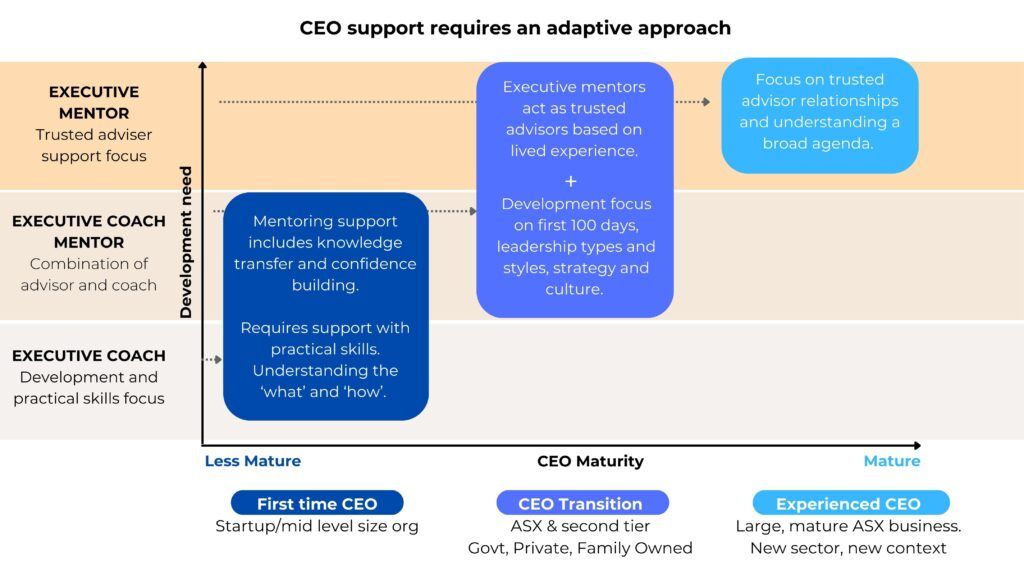The surprising reasons new CEOs fail—and what to do about it
The surprising reasons new CEOs fail - and what to do about it
CEOs have a high rate of failure when they step into a new role. Some estimates indicate outright failure of CEOs in the first 18 months of their tenure at 38% to 50%. Other sources suggest figures as high as 50-70%.
Why do new CEOs fail?
Entry into the CEO role can look different depending on the organisation size, whether they are an internal or external appointment, the sector, the type of company and many other variables. Research shows that internal CEOs improve long-term performance and engage in less strategic change, while hiring an outside CEO leads to more strategic change that results in lower long-term performance [2]. Many CEOs reach this north star due to their potential and their performance within their functional area of the organisation.
However, once a new CEO commences in the role, regardless of whether they have been an internal or external hire, oftentimes they face a steep learning curve as they confront issues like:
- Navigating Board relationships and behaviours
- Building Executive Team cohesion and effectiveness
- Understanding nuances of the company, territory, country
- Understanding regulatory and governance requirements
- Managing broader stakeholder relationships such as internal teams, external stakeholders and shareholders.
- Macro issues such as global trade regulations, understanding distribution channels etc.
- Identifying and implementing organisation-wide cost reduction programs.
- Assessing, adopting or adjusting and embracing the company culture
Experienced CEOs liken it to a pressure cooker environment, and whilst many believe they can learn on the job, this can lead to a wake of collateral damage without the right support.
Research from the University of Southern Carolina, indicates that the primary cause of external failures appears be an inability to develop trusting relationships, particularly with members of the Executive Leadership Team (ELT). Other sources assert that a whopping 82% of new CEOs fail because they don’t build relationships with their people.
Another critical relationship is that of the CEO, Board and Chair. Australian Institute of Company Directors, highlights that when the partnership between a board and CEO – and in particular, between chair and CEO – is dysfunctional, it is only a matter of time before it affects the organisation’s overall performance.
In times of high pressure, even the best leaders can revert to negative behaviours and fail to listen to all stakeholders. Stress can result in significant changes to behaviour patterns, which at the time may not be realised by the leader but can leave a lasting impact on their executive team, and the wider organisation. CEOs need to be able to maintain a sense of calm and order as they lead their organisations through challenges.
A CEO’s primary responsibility — company decision making—accounts for 45 percent of a company’s performance [1]. The flow on effect of poor decisions made by an underperforming or unprepared CEO, can be eternally damaging to a company’s reputation and amplify poor business performance.
Executive Coach Mentor, Scott Levy, indicates that feeling isolated is a reoccurring theme often cited by CEOs during Executive Coaching sessions. CEOs are often faced with weighty decisions that have lasting impacts, particularly on their people. Being the person responsible for these decisions can take its toll.
And everything you say and everything you do is elevated accordingly."
- Scott Levy, Executive Coach Mentor
What type of support is available?
Executive Coaching and Executive Mentoring both have key roles to play in supporting a CEO as they navigate their role. But often there is confusion around exactly what the difference is between the two.
Two key areas where Executive Coach Mentors can provide the most impact:
rather than just running the business."
- Ian Morrice, Executive Coach Mentor
- Susan Ferrier, SMG C-Level Executive Coach Mentor
Finding the right solution
The positive outcomes that can be gained from a successful executive coaching engagement are immense. According to Forbes “When leadership abilities are honed, the outcomes are multifaceted: improved strategic decision-making, amplified team dynamics and a consequent elevation in overall organisational efficacy.”
- Increased levels of confidence in managing their role
- Increased ability to cope and manage effectively in times of stress
- Stronger employee engagement as a result of better leadership
- Longevity in CEO role
- Agility and capability to lead through challenging circumstances like global market shifts, mergers and acquisitions.
Finding the right match is critical in setting the coaching pair up for success. The coachee needs to be open to being coached and putting in the work required to reap the rewards.

Persona 1 – First time CEO of smaller organisation/Start up
First time to C-suite but has advanced development (requires
some mentoring in specific areas).
Executive Coaching period (6-12 months).
Priorities:
- Shifting from working in the business to on the business
- Understanding the WHAT and HOW
- Developing key skills in guiding and supporting
- Strategy and structure of team
- Leadership and culture strategy
Coaching can support with:
- Reframing from functional area to org-wide focus
- ow to be a successful CEO
- How to navigate the role
- Understanding behaviours (self)
Persona 2 – New to CEO role of a large global organisation, and/or ASX
Primary focus on first 100 days. ECM assignments generally range from 6-18 month duration.
Priorities:
- Managing Stakeholders
- Strategy and structure of team
- Leadership and culture strategy
- Team Effectiveness
Executive Coaching and Mentoring can support with:
- Bring a trusted advisor
- Navigating dynamics of relationships at CEO level
- Shifting from functional area to all of org
- Building networks
Persona 3 – CEO of ASX business
Focus on broader agenda and macro issues. Executive Mentoring period (6-12 months).
Priorities:
- Stakeholders – micro and macro
- Agility around decision making
- Understanding the market dynamics
- Board relationships and agendas
- Aligning organisational priorities
Executive Mentoring, can support with:
- Navigating disruption
- Stakeholder management
- A safe space for confidential discussions
The benefits of establishing a trusted relationship with an Executive Coach extend beyond individual outcomes. In the vast majority of engagements facilitated by Stephenson Mansell Group over the last 26 years, outcome reporting demonstrates that the positive impacts extend beyond the individual to the Executive team, the wider organisation, and in some cases the industry and community.
[1] Chris Bradley, Martin Hirt and Sven Smit, Strategy Beyond the Hockey Stick: People, Probabilities and Big Moves to Beat the Odds, Hoboken, NJ: John Wiley & Sons, 2018.
Authors

Virginia Mansell is a clinical and organisational Psychologist and Founding Partner Stephenson Mansell Group. She has coached and mentored CEOs and in the financial services industry for more than three decades and is currently on the Board of a US based FinTech company, Coaching.com. Her book, “The Focused Executive” provides sage insight on effective leadership, supporting leaders to transition from operational management to strategic, visionary leaders. This work has evolved into a comprehensive blended learning solution, integrating digital learning with personalised executive coaching. Virginia introduced a range of leadership programs to SMG, including ‘Advanced Leader as Coach’, ‘Women’s leadership Program’, and ‘Leadership at the Peak’.

Mehul Joshi is an award winning former BBC broadcast journalist, Senior Partner and Head of the Leadership Practice at SMG. Mehul is a sought-after ‘C-level’ executive coach, leadership consultant and high-performance team facilitator. Bringing thought-leadership to all his client engagements, Mehul is a prolific business writer. His articles and opinion pieces on leadership have appeared in publications such as The Sydney Morning Herald, Australian Financial Review, Company Director, and Yahoo Finance.

Susan Ferrier is an accomplished c-suite executive and board director with more than 17 years at the CEO-1 level and over 40 years of international experience working in global roles in multi-jurisdictional contexts. With significant expertise and experience in coaching and mentoring senior executives, Susan’s career has been exemplified through her support to individuals to help them drive collaborative ethical cultures. Susan was the Group Executive for People & Culture at National Australia Bank (NAB) for four years where she was accountable for culture and risk culture for the enterprise (40,000 people over 11 geographies) and led the Human Resources function. For the previous eight years, Susan held several roles at KPMG including the Global Head of People, the Global Head of Inclusion & Diversity and the National Managing Partner for People for the Australian firm.

Scott Levy is an accomplished global Chief Executive, Non-executive Director and Coach/Mentor with a career defined by a passion for leadership, strategic thinking, and an unwavering commitment to commercial excellence. With a keen entrepreneurial spirit and an intense customer focus, he has and has an exceptional track record in growing successful businesses in the Asia-Pacific region across diverse industries. Scott’s approach to leadership is characterised by a holistic perspective, an emphasis on entrepreneurship, and a focus on customer-centric strategies. He is known for his ability to tackle complex challenges with innovative solutions, taking a macro view of the business landscape. His strategic thinking and lateral problem-solving skills have consistently delivered tangible results.

Suite 2. 2/3 Shore 13 Hickson Road, Walsh Bay NSW 2000
Ph: +61 2 9950 2000 | Contact Us
Privacy Policy | Terms of Use
